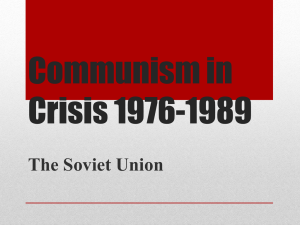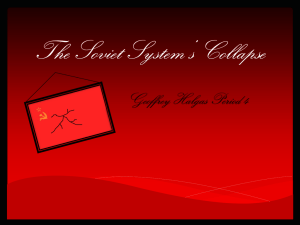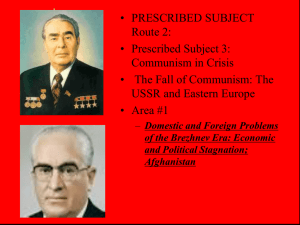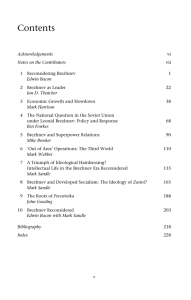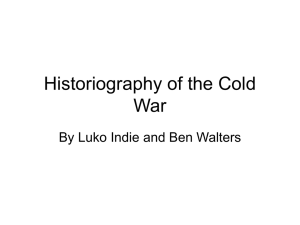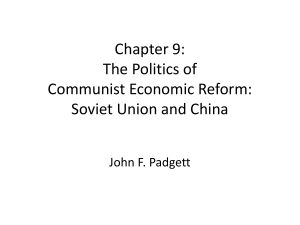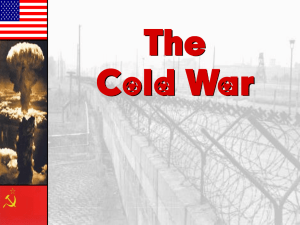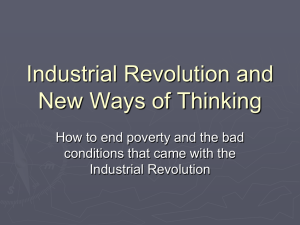Economy and Politics Under Brezhnev
advertisement
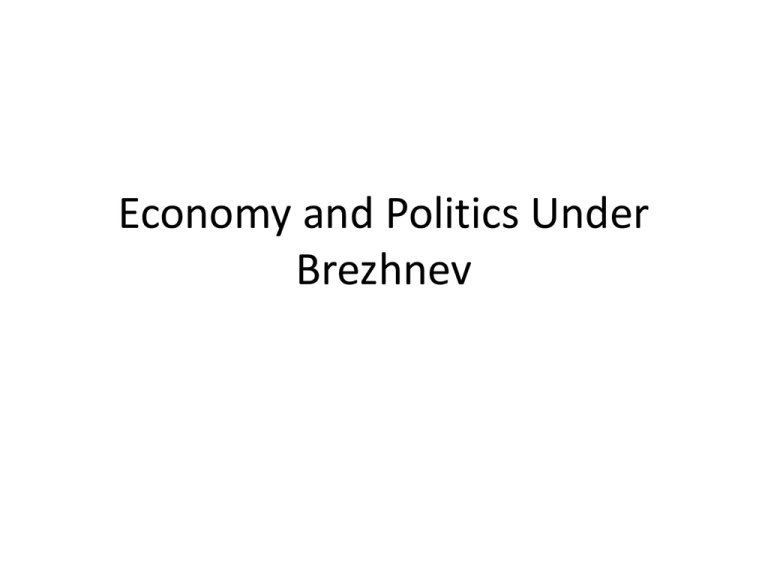
Economy and Politics Under Brezhnev Introduction to Economy • By 1976, Soviet model already showing signed of crisis • Had been masked by things like Sputnik, first man in space, aid to allies, development of high-tech weaponry Planned Economy • 1928, Stalin first Five-Year Plan for ‘socialism in one country’ – Had not been the worldwide revolution Lenin had predicted – Gosplan • 1955, Khrushchev reformed with modernization – Didn’t really work, hardliners skeptical – Overthrown in 1964 Soviet Economy From 1964-70 • Brezhnev first secretary, Alexei Kosygin prime minister • Time characterized by stagnation • Some attempts at industrial reform by Kosygin – Revived Khrushchev’s push for autonomy in factories – Took control from party, received opposition – Brezhnev obstructed him, argued for agricultural buildup over industry, actually led to increases – Kosygin’s plan worked for a while, but then returned to centralization Brezhnev’s Policies 1970-76 • Early 70s, Soviets seemed strong, militarily and industrially • Brezhnev maintained kolkhozy collectives • 9th Five-Year Plan 197175, expanded production of light consumer goods • 1973, oil crisis, boom in raw materials, opportunity to reform Soviet economy, did not 10th Five-Year Plan (1976-80) • • Gold, oil and gas producer 1976, called for further consolidation of kolkhozy, but many operating at a loss due to costs – Brezhnev raised wages, kept workers happy – Still problems, 1979 have to buy from N. America – Brezhnev just increased state investment, not a solution • Showed real signs of industrial slowdown, less production then planned – 1979, decree on industry, still decline – Little fresh thinking, did create ‘associations’ • • Still problems with workers Brezhnev continued movement toward consumer goods, but slowed again in 1976 Social Developments and Developed Socialism • Many aspects of life improved under Brezhnev – Social wages improved – Trade unions opened opportunities • Social mobility slowed – Other social problems • Despite problems in 1966, Soviets thought they were in a second phase called “developed socialism” Economic Reforms 1982-85 • Brezhnev died in 1982, second-longest tenure – Admitted in 1981 there were economic difficulties – Had considered becoming closer to China to improve security – Sec. of Ideology Yuri Andropov had been posturing • Supported by Minister of Defence, rather than Konstantin Chernenko who had support of PM Tikhanov • Military coup? Andropov and Reform • • • • • Had been Hungarian ambassador in 1956, seen attempts at reform Was KGB, had accurate info on what was working Did not want to end Soviet system, just modify it Campaigns against absenteeism, alcoholism Tried to make his camp younger, avoid Brezhnev’s ‘drift’ – Protégé Gorbachev • • • More power to managers, rewards for production, similar to Kosygin 1983, contradicted ‘developed socialism’ Died in Feb. 1984, not enough time Chernenko and ‘Drift’ • Andropov hoped for Gorbachev to replace him • Those opposed to reforms, Brezhnevites, decided on Konstantin Chernenko, 72, old – Probably due to his weaknesses • ‘Look before you leap’ – Limited changes • Increased defense budget – Against corruption • Chernenko ill in 1984 – Govt. run by defense minister Dimitri Ustinov and Gorbachev – Gorbachev taking ideological control – Became general-secretary in 1985 Impact of Cold War on Economy • Impact of arms race meant limited industrial and agricultural reforms – Spent twice as much proportionally to the US – Arms industry known as ‘steel eaters’ • May have been the point of ending détente – Threat of US meant limited reforms until Gorbachev Introduction to Politics • After 1976, somewhere in transition between socialism and capitalism • Battle between party control and economic control • Failure to recognize problems during Brezhnev meant problems later Brezhnev’s Early Consolidation • After Khrushchev, cant be PM and CPSU leader • Brezhnev first secretary, Kosygin PM, Nikolai Podgorny became head of state • Khrushchev’s reforms reversed • Brezhnev asserted dominance, title to general-secretary – Sought stability Nomenklatura and Brezhnev Mafia • Nomenklatura a long list of reliable members – Also helped to have a sponsor – Top-heavy with aging hardliners – Brezhnev Mafia, men working with him since 40s • 1978, average age was 68 • Favored continuation – Did remove potential threats like Podgorny, took presidency • Able to block Kosygin’s reforms • Supporters appreciated stability after Stalin and Khrushchev Cult of Personality • 1976, ‘universally acclaimed leader’ • 1980, gave himself Second Order • Evidence were 1982 elections, right before his death, no changes Party Stagnation and Corruption • Conservatism had an impact on membership • Brezhnev also made stricter requirements • KGB noted increasing corruption • Younger members appalled, public had less respect Developed Socialism • Khrushchev had sought true classless society – Had even envisioned multiparty state • Brezhnev reversed mass political involvement – The educated became frustrated • 1971, ‘Developed socialism’ meant construction stage was over, became spoken of less and less Brezhnev Constitution • 1977, 60th Anniversary of 1936 Constitution – Declared developed status – CPSU the leading force – Had been intended to introduce socialist democracy, contained various freedoms • Not really present Dissidents • • • • Some pushed limits as Soviets would not go back to harshness of Stalin Brezhnev tightened some controls, treated dissidents as spies or psychologically disturbed 1966, limits on ‘false information’, attitudes further hardened after Prague Spring in 68 Standards of living meant some acceptance so opposition may have been limited – Some underground material • • 1975 Helsinki Accords were a boost Many saw progress was being halted Nationalism • Dissent in Eastern Europe – Ukraine, Georgia, Estonia, Latvia, Afghanistan – Brezhnev uses media to dismiss them – Gorbachev will not be able to handle these movements Brezhnev’s Foreign Policies • Economic pressures meant Brezhnev sought improved relations with the West – Also playing against China – Czech invasion of 68 initially made détente difficult – Kosygin tried to improve West relations • Brezhnev needed bargaining power, continued buildup while opening talks – SALT in 1970 • 1976 US decided to begin ending détente Eastern Europe and Afghanistan • Brezhnev needed buffer of Eastern Europe – Motivated response to Hungarian Uprising and Prague Spring – Brezhnev Doctrine in Comecon allies • Poland borrowed from Western banks – Solidarity formed in 1980 by Lech Walesa – Revolution in government – Solidarity sent away • Other Eastern European states began relationships with West • Soviet invasion of Afghanistan an example of Brezhnev Doctrine in 1979 Andropov and Politics • • • • • • • Made changes on lower levels to push through reforms Tough stance on corruption to weaken Brezhnev appointees Had no plans for fundamental changes though, arrested the ‘Russian New Left’ Had experience with dissenters as former head of KGB Did encourage normal citizens to voice concerns, less arbitrary arrests Conservative approach to foreign policy, did not withdraw from Afghanistan Reduced space program and suggested further arms control Chernenko and Politics • Brezhnevite, won out over Gorbachev • Maintained his conservatism, limited personnel changes • Continued countering corruption, hard line on dissent • Tried to resume détente, Reagan’s Star Wars made it impossible • Gorbachev made himself a champion of reform and military reduction, takes power when Chernenko died in 85 Paper 1 Practice, Question 1 A How successful were economic reforms under Brezhnev? Paper 2 Outline Practice • How did Brezhnev’s style of rule contribute to the developing political crisis of the Soviet Union up to 1982?
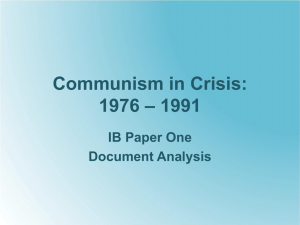

![The_End_of_the_Cold_War[1]](http://s2.studylib.net/store/data/005216723_1-d7985d2049f1fbeae49e8feeba5d6d3b-300x300.png)
